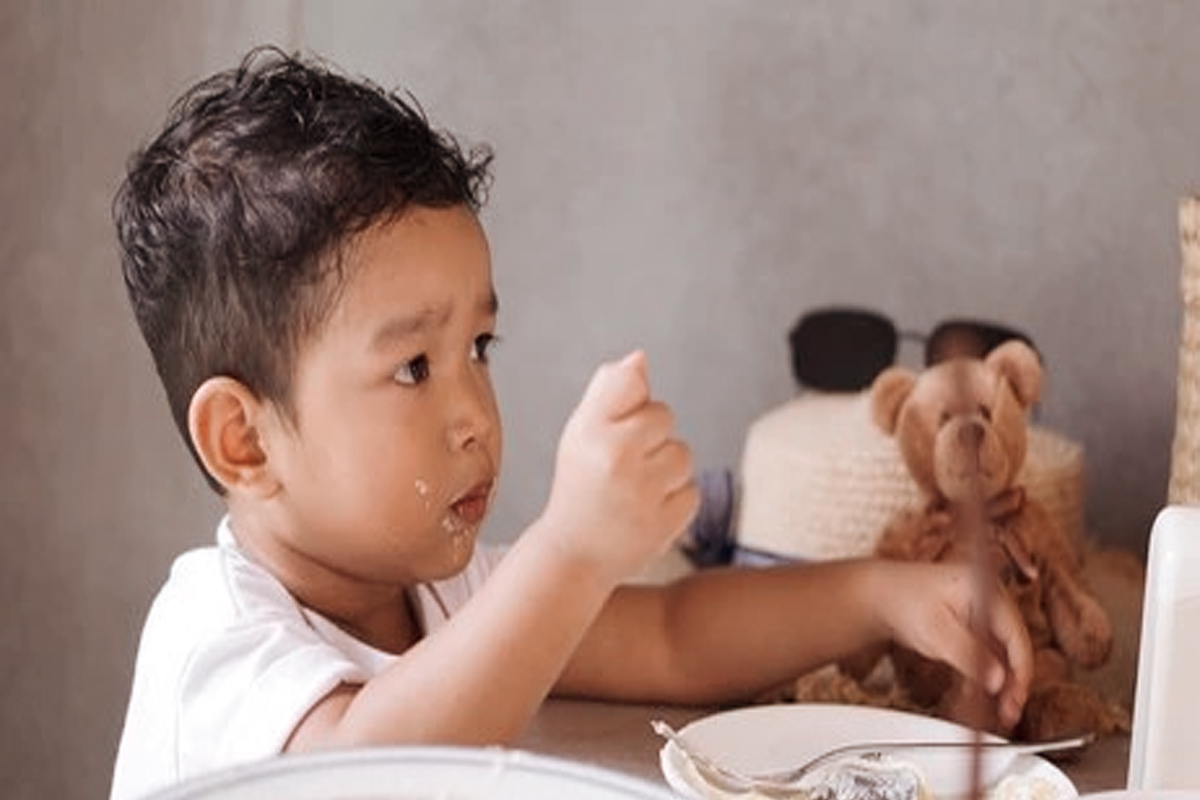The 12th month marks a significant milestone in a baby’s development. Most babies are celebrating their first birthday around this time, a joyous occasion for both parents and little ones. At this stage, many toddlers are taking their first steps confidently and exploring the world with newfound independence. Their vocabulary is expanding, with attempts at speaking words and understanding simple instructions.
Encourage fine motor skills by introducing activities that involve stacking blocks or playing with small toys. A diverse and nutritious diet supports their overall growth and development. Safety remains paramount, so ensure that the environment is childproofed.
Regular visits to the pediatrician continue to be crucial for monitoring growth, addressing any concerns, and receiving guidance on nutrition and vaccinations. As your baby transitions into toddlerhood, relish in the marvel of their development and the exciting journey that lies ahead.
Table of Contents
ToggleWhat are the Baby’s Development and Milestones on the 12th Month
Motor Skills
- Walking. Many babies start taking their first steps, transitioning from cruising to independent walking.
- Fine Motor Skills. Improved ability to pick up small objects using their thumb and forefinger.
Language and Communication
- Vocabulary Expansion. Your baby may say their first words and understand simple commands.
- Gestures. Increased use of gestures like pointing to express needs or show interest.
Social and Emotional Development
- Attachment. Stronger emotional bonds with primary caregivers.
- Playing Pretend. Beginning to engage in pretend play, imitating everyday actions.
Cognitive Development
- Object Permanence. Improved understanding that objects still exist even when out of sight.
- Problem-Solving. Attempting to solve simple problems, like fitting shapes into corresponding holes.
Feeding Independence
- Self-Feeding. Increased ability to self-feed with fingers and a spoon.
- Transition to Solid Foods. Progressing to a wider variety of textures and flavors.
Sleep Patterns
- Transition to One Nap. Some babies may transition to one longer nap during the day.
- Establishing Routine. A more established bedtime routine for better sleep habits.
Social Interaction
- Playing with Others. Beginning to engage in parallel play alongside other children.
- Responding to Emotions. Showing empathy and responding to others’ emotions.
Teething
- Full Set of Teeth. By 12 months, many babies have a full set of primary teeth.
- Teething Discomfort. Some may experience discomfort, so provide appropriate teething relief.
Independence Building
- Exploring Independence. Demonstrating a desire for independence in daily activities.
- Dressing Assistance. May attempt to help with simple dressing tasks.
Health Check-Up
- Schedule a 12-month check-up with the pediatrician for vaccinations and growth assessment.
- Discuss any concerns about development or behavior.
What are the activities needed to Support your 12-month-old baby’s development
Walking Practice
- Encourage walking by holding your baby’s hands and guiding them.
- Use push toys to provide support as they take independent steps.
Fine Motor Skills
- Introduce stacking and nesting toys to enhance hand-eye coordination.
- Offer small objects for them to pick up and explore with their fingers.
Language Development
- Engage in conversations, responding to their babbling with enthusiasm.
- Read colorful books with simple stories and point to objects.
Social Interaction
- Arrange playdates for your baby to interact with other children.
- Play simple turn-taking games to encourage social skills.
Imaginative Play
- Introduce toys that encourage imaginative play, such as dolls or stuffed animals.
- Play pretend games, like feeding a doll or talking on a toy phone together.
Sensory Play
- Provide sensory experiences with safe materials like playdough or textured fabrics.
- Let them explore different textures through touch.
Outdoor Exploration
- Take your baby outside for fresh air and exploration.
- Use a soft ball for rolling or gentle tossing to improve coordination.
Water Play
- Supervised water play in a shallow basin can be enjoyable.
- Introduce cups and toys for pouring and splashing.
Art Exploration
- Provide large, washable crayons and paper for scribbling.
- Allow them to explore different art materials safely.
Daily Chores
- Involve your baby in simple tasks like picking up toys or helping with feeding.
- This promotes a sense of responsibility and independence.
How Much Sleep Does Your 12-Month-Old Baby Need
Nighttime Sleep
- Aim for 11 to 14 hours of sleep in 24 hours.
- Most babies at this age sleep for about 11 to 12 hours at night.
Nap Frequency
- Many 12-month-olds take two naps a day, each lasting around 1 to 2 hours.
- Some may transition to one longer nap during the day.
Teething Considerations
- Be mindful of teething discomfort, which might temporarily affect sleep.
- Provide soothing measures like teething toys or a cool washcloth.
How to Feed Your 12-Month-Old Baby
Transition to Table Foods
- Introduce a variety of family foods, chopped into small, manageable pieces.
- Encourage self-feeding with fingers or a spoon to promote independence.
Balanced Diet
- Include a mix of fruits, vegetables, grains, proteins, and dairy in their meals.
- Aim for a balanced diet to provide essential nutrients for growth.
Whole Milk Introduction
- Introduce whole cow’s milk if recommended by your pediatrician.
- Limit milk intake to about 16 to 24 ounces per day.
Limit Sugar and Salt
- Minimize added sugar and salt in their diet.
- Choose natural sweetness from fruits and limit processed foods.
Meal Frequency
- Aim for three main meals and 1-2 snacks per day.
- Allow your baby to decide how much to eat, respecting their hunger and fullness cues.
Cup Introduction
- Introduce drinking from a sippy cup or a regular cup.
- Gradually transition away from bottle feeding.
Supervision During Meals
- Stay with your baby during meals to monitor their eating and prevent choking.
- Encourage positive mealtime interactions.
Independence Building
- Allow your baby to feed themselves with utensils, even if it gets messy.
- Foster independence in choosing and eating their food.
Day in the Life of a 12-Month-Old Baby
Feeding
- Typically involves 3 meals and 2 snacks per day
- The amount of food needed for a 12-month-old is usually around 1,000 calories per day
Sleeping
- 13-15 hours of sleep in 24 hours
- A common nap schedule involves 2 naps, totaling 2-4 hours during the day
Bathing
- Recommended to bathe about 3 times a week
- Engage with the baby by talking, singing, and playing with bath toys to keep them relaxed and entertained
Changing Diapers
- At 12 months old, babies typically use up to 7 diapers a day
- It is also important to watch for signs of constipation or diarrhea
Playing
- Begin the day with interactive play, incorporating toys that stimulate the senses.
- Explore soft books, rattles, or sensory toys to engage your baby’s curiosity.
- Introduce simple puzzles with large, graspable pieces.
- Explore water play in a safe environment, such as a shallow basin or a baby-friendly water table.
Fun Facts
- At this age, babies are becoming more capable of feeding themselves and expressing themselves, and they may be gearing up to take their first steps
Baby’s Health at 12-Month-Old
Nutrition
- Continue providing a well-balanced diet with a variety of fruits, vegetables, grains, and proteins.
- Introduce whole milk as recommended by your pediatrician to meet their changing nutritional needs.
Dental Care
- Maintain regular dental care, brushing your baby’s teeth with a soft-bristled toothbrush and non-fluoride toothpaste.
- Schedule dental checkups to monitor oral health.
Immunizations
- Confirm that your baby’s vaccinations are up-to-date, following the schedule recommended by your pediatrician.
- Discuss any additional vaccinations recommended for the 12-month age range.
Regular Check-ups
- Schedule routine well-baby visits with your pediatrician for comprehensive health checkups.
- Discuss any questions or concerns about your baby’s health and development.
Items Needed on the 12th Month of Your Baby
Supportive Shoes
- If your baby is walking or cruising, it’s time for their first pair of shoes. Look for flexible, nonskid soles and room for growth
Childproofing Supplies
- As your baby becomes more mobile, it’s important to ensure your home is safe. This includes securing furniture to the wall, using safety gates, and keeping small objects out of reach
Baby Toys
- Age-appropriate toys, such as gross motor skill toys, cause-and-effect toys, and interactive board books, can help stimulate your baby’s senses and cognitive development
Feeding Supplies
- Your baby may be transitioning from formula to whole milk and eating more solid foods. Ensure you have age-appropriate utensils, plates, and cups for your baby
Diapers, Wipes, and Diaper Rash Cream
- As your baby grows, they will require frequent diaper changes, so having a good supply of diapers, wipes, and diaper rash cream is essential
Nursery Furniture and Gear
- As your baby grows, they will need appropriate furniture and gear for their sleeping, eating, and playing needs
Life as a Parent on Baby’s 12th Month
As you reach the twelfth month of your baby’s life, a significant milestone is on the horizon. This period marks not only the end of the first year but also the beginning of exciting new adventures in parenting. Let’s explore the unique aspects of this stage and ensure a positive and enriching environment for both you and your growing child.
First Birthday Celebration
- Celebrate this momentous occasion with joy and festivities. The first birthday is a special milestone for both you and your baby. Create lasting memories through a small gathering, introducing your little one to the joy of celebrations.
Language Development Peaks
- Language skills are likely reaching new heights. Engage in conversations, read together, and encourage verbal expression. Respond warmly to their attempts at communication, fostering a rich language environment.
Motor Skills Mastery
- Fine and gross motor skills continue to develop. Provide activities that challenge and enhance their physical abilities, such as stacking blocks or engaging in simple puzzles. Celebrate their newfound mastery in movement.
Independence and Autonomy
- Independence takes center stage. Encourage self-help skills like feeding themselves and exploring their surroundings. Support their autonomy while ensuring a safe environment for their newfound explorations.
Social Interactions Flourish
- Social interactions become more dynamic. Encourage playdates, fostering social skills, sharing, and cooperation. Observe their interactions to ensure positive experiences with peers.
Sleep Routine Stability
- A stable sleep routine remains crucial. Continue with a calming bedtime ritual to facilitate restful sleep. Be attentive to their evolving sleep needs and address any challenges with patience.
Emotional Expressions Deepen
- Your baby’s emotional expressions become more pronounced. Respond with empathy and understanding, reinforcing the secure emotional bond between you and your child. Validate their emotions as they navigate this expressive phase.
Checklist for the 12th Month of Your Baby
Shop for Shoes
- If your baby is walking or cruising, it’s time for their first pair of shoes. Look for flexible, nonskid soles and room for growth
Schedule the 12-Month Checkup
- At this visit, your baby may receive vaccines for measles, mumps, and rubella (MMR), Hepatitis A, and Varicella (chickenpox). They may also be due for a booster shot for earlier vaccines
Feeding
- Many 12-month-olds are becoming more capable of feeding themselves and may be transitioning from formula to whole milk. They can eat most of what the rest of the family eats, as long as it’s cut into small, manageable pieces
Development and Milestones
- Your baby may be gearing up to take their first steps, and their diet and sleeping patterns may be changing. They are gaining confidence and independence along with their new mobility
Safety
- Ensure your home is safe for a walking or cruising baby. This includes securing furniture to the wall, using safety gates, and keeping small objects out of reach
Last Updated on January 15, 2024
Written By
With a solid foundation in family dynamics, child development, and a knack for assessing products, our content is built on a strong grasp of our topics. We use trustworthy sources, seek advice from experts, and stay current with the latest happenings in our fields. We always give credit to our sources, reveal any possible conflicts of interest, and deliver info in a truthful and unbiased way. Follow us on Facebook or join our Facebook Group.
Start your journey to confident parenting
Join over 2,000+ parents who receive free practical advice and tips from Joyful PH. Unsubscribe anytime.
You may also like
Toddler’s Development and Milestones at 24th Month
A two-year-old's growth and achievements at 24 months are remarkable. Toddlers…
Toddler’s Development and Milestones at 23rd Month
In the 23rd month, toddlers exhibit significant developmental strides. Their…
Toddler’s Development and Milestones at 22nd Month
At 22 months, toddlers make strides in independence, speech, and motor skills.…
Toddler’s Development and Milestones at 21st Month
During the 21st month, toddlers continue their dynamic development. Language…
Toddler’s Development and Milestones at 20th Month
At 20 months, toddlers exhibit remarkable progress. Their language skills…
Toddler’s Development and Milestones at 19th Month
A toddler at 19 months undergoes significant development. Language skills…







